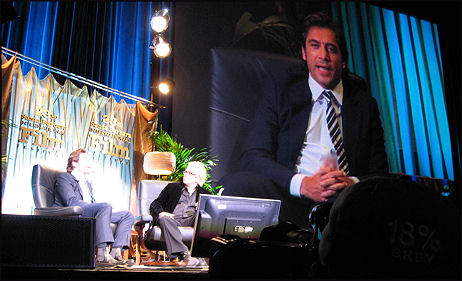The less money you have to work with, the more visually creative you’re forced to be. (And vice versa.) And yet Mark Romanek (One-Hour Photo) recently walked off Universal’s The Wolfman (i.e., the Benicio del Toro vehicle) because, according to a Nikki Finke item, “He’s a purist, an artiste, an exquisite craftsman, but he just had a budget schedule” — a reported $100 million — “he couldn’t accomodate…he just blew the opportunity of a lifetime.” This doesn’t add up at all. Nobody’s consumed by that much hubris…are they?
O’Hehir talks to Mungiu
Salon’s Andrew O’Hehir (whose last name I’ve never learned how to pronounce…do you say it like Chicago’s O’Hare airport?) has an indie-film column on Salon.com called “Beyond the Multiplex”, and today he has an interview with 4 Months, 3 Weeks & 2 Days director Cristian Mungiu, along with an mp3 interview that won’t load.

Funeral Crasher
Why couldn’t I stop myself from chuckling while reading this 1.29 N.Y. Post story (by Jamie Schram and Dan Mangan) about some douchebag who scammed and hoodwinked several people (including Tom Cruise) by pretending to be Kim Ledger, the grief-struck father of Heath Ledger? Using the cloak of tragedy to exploit people’s emotions (and to attempt to scam free death-swag) is beyond foul, and yet a good con man will never let a thing like decency stand in the way. It’s so outrageous it’s almost a movie — The Wake Crasher.
Kehr flubs “El Cid” tech specs
Not to nitpick, but N.Y. Times DVD columnist Dave Kehr has gotten it slightly wrong in his review of the new double-disc El Cid DVD by claiming it was “filmed in Super Technirama, a 70-millimeter widescreen process.” Anthony Mann‘s epic was actually filmed (as was Spartacus) on a 35mm, 8-perf, horizontal-through-the-gate process that was then blown up into 70mm. The correct term would be that it was shown or “presented” in Super Technirama 70.
Otherwise, Kehr does a nice job of explaining the various financial motives and political back-currents behind the making of El Cid, and the resultant metaphors that one could fairly apply to the finished film.
Bardem, Durling at the Arlington
The best interview of the ’08 Santa Barbara Film Festival — easily the warmest and most charming — happened last night between No Country for Old Men star Javier Bardem (wearing an exquisite dark-blue suit) and SBFF director Roger Durling. Half confessional and half goof-off session, it was marked by laughter, honesty, astute insights and openly longed-for bathroom breaks.
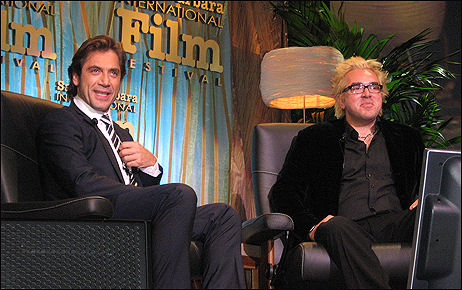
Best Supporting Actor lock Javier Bardem, Santa Barbara Film Festival director Roger Durling during last night’s Montecito Award tribute
Perhaps relaxed by their Latin connection, Durling’s questions were simple but down to it, allowing Bardem to roll every which way and be his uncannily articulate self (especially for someone whose English skills were marginal four years ago). Calling it “a total loosey-goosey pleasure” sounds like a suck-up sentiment, but that’s what it was.
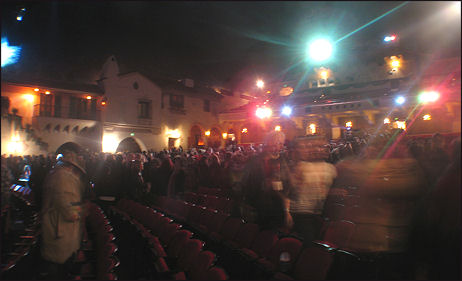
For those who’ve never visited Santa Barbara’s Arlington Theatre, it may be hard to comprehend that this is a photo of the actual interior and not some outdoor town square in Barcelona or Vera Cruz, Mexico
Cautiously standing
“When Bush warned the Iranian government that ‘America will confront those who threaten our troops, we will stand by our allies, and we will defend our vital interests in the Persian Gulf,’ Obama jumped up to applaud. Clinton leaned across Sen. Joseph Biden (D-Del.), seated to her left, to look in Obama’s direction before slowly standing.” — from an account of last night’s State of the Union speech by The Hill‘s Alexander Bolton.
Hooray for older women and Hispanics
Hats off, older women and Hispanics, for coalescing solidly behind Hillary Clinton coast to coast, and thereby all but ensuring the death of a beautiful dream and (bonus!) the triumph of a frosty and divisive harridan whose candidacy will unite the right by inflaming it, and whose presidency will bring back a corrosive revival of the Hate Wars of the ’90s. Precisely what this country needs.
A Newsweek report explains that Hispanic voters are guided partly by ignorance (a fall ’07 survey found that a quarter of Hispanics had “never even heard” of Obama) and racial animosities (i.e., longstanding competitive struggles with African- American communities “over resources, representation in politics, education”).
The myopia pervading the ranks of middle-class women has come into clear relief over the last several weeks. Rather than turn the page and usher in the possibility of a new era and a new attitude, they want a woman in the White House…period. The likelihood that Hillary forces will go down to defeat waving the flag of sisterly solidarity or, if she wins, revive the rightist rage of the ’90s matters not to them. The possibility of symbolic gender triumph is all. They will not see.
Santa Barbara social columnist Craig Smith told me last night that every over-40 woman he knows in the area is square behind Hillary — no ifs, ands or buts. Consider, also, the emotionally fevered “with us or against us!” sentiment in this anti-Ted Kennedy statement issued yesterday by NOW (Nat’l Organization of Women).
Politico‘s Jeff Ressner spoke with poet-rocker Patti Smith during Sundance and even she — Patti Smith! — was skeptical about Obama. “I’m still waiting to hear an emotional connection to him,” she told Ressner. “I haven’t felt it, and I don’t know why.” I think I do. Forget it. Game pretty much over.
Embarking on “Juno”-hate
“While you won’t yet find a clear front-runner among Best Picture nominees, it’s never too early for Oscar observers to pile on the movie they don’t want to win,” writes Vanity Fair Daily‘s Stu Van Airsdale. “Crash and Little Miss Sunshine kept the bile churning in 2005 and 2006, respectively, and it appears now that Juno is bracing itself for this year’s hater backlash.

“My colleague Tim Long alluded to this phenomenon here the other day, confessing, ‘I guess I sort of — gulp — liked the movie,’ and invoking something called the Collective Anger Quota to excuse his fondness. I, too, found Juno funny, well-acted, and entertaining enough to recommend. That was before Oscar season, however, when hyperbole stakes could be quantified by box-office gross and pop-culture saturation.
“Post January 22, Juno is no longer the quirky, low-budget sensation teeming with hamburger phones and the mile-a-minute bons mots of stripper-turned-screenwriter Diablo ‘Not Her Real Name’ Cody. Or rather, it is all that, now vigorously challenging milestones like There Will Be Blood (my favorite) and No Country for Old Men for Oscar supremacy.
“We’re cool, Juno, but this cannot be.”
Matthews bids adieu
After 30 years on the movie beat, N.Y. Daily News critic Jack Matthews is packing it in and heading off to Oregon to write books. (Specifically “a long-gestating novel about the college co-ed considered by many to have been the Zodiac’s first victim — a murder I covered as a cub reporter,” he says.) Jack is a good fellow, shrewd but fair-minded, known and liked by everyone…best to him. I will never stop banging it out. One is either busy being born or busy dying. I know where I stand. Die at your desk.
Live Democratic debate
Hollywood Elsewhere will have a seat at L.A.’s Kodak Theatre (i.e., where the Oscars have happened for the last few years) this coming Thursday for the final Democratic Primary debate — Obama, Clinton, Edwards — prior to “tsunami Tuesday” on 2.5. The show will air from 5 pm to 7 pm Pacific.
Ugly strike scenario
Past Deadline‘s Ray Richmond has passed along an “undeniably pessimistic and hardcore but I believe at least semi-plausible theory” about what may soon be going on regarding WGA-AMPTP negotiations:
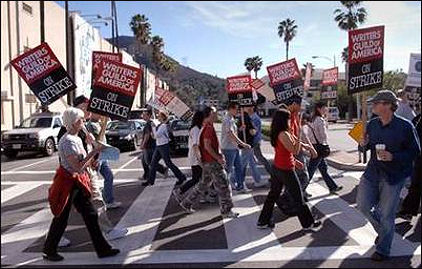
“The studios make a deal with the Directors Guild, whose residual guarantees don’t come close to matching what the WGA is seeking. A producer rep circulates around the idea that things are looking up and informal talks have commenced. There is a resumption of in-person bargaining, followed quickly by an abrupt break-off and the usual angry recriminations along the lines of ‘So it seems those arrogant bastard writers think they’re worth more than the directors!’ and “We held out an olive branch and they ripped it to shreds!”.
“The producers still have done nothing to move the talks forward — or in truth even start them — yet can seize the moral high ground. The WGA side will have been lured into a trap. The premise postulates that the studios have zero interest in ever coming to a reasoned agreement but are instead moving resolutely forward on a campaign of solidarity splintering and ultimate guild destruction.”
A “creative paycheck” gig for Del Toro?
Having delighted at the aesthetic development and career-growth arc of the great Guillermo del Toro over the last 15 years (i.e., from 1993’s Cronos to Hellboy 2), I’m a tiny bit sorry to read that he’s on the verge of taking a job to direct back-to-back installments of J.R.R. Tolkien‘s The Hobbit, according to the Hollywood Reporter‘s Borys Kit.
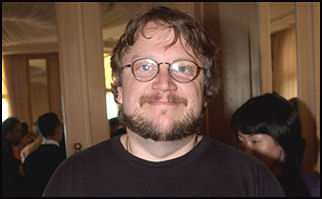
Guillermo will do an excellent job, I’m sure, for his employers — producer Peter Jackson and New Line and MGM — and the fans will be with him, but cranking out two more Tolkien movies after the Lord of the Rings trilogy…yeesh. Where is the genuine hunger to see these films made beyond the New Line stockholders who will profit from them? Del Toro is an old soul who’s capable of much, much more than taking what amounts to a “creative paycheck” job of this sort and playing the jolly maestro for a symphony that has already been written, played and, in a literary sense, digested. Where is the discovery or the challenge for Del Toro in doing this?
At best he’ll get the kind of thumbs-up critical responses that Alfonso Cuaron got from directing Harry Potter and the Prisoner of Azkaban, which is to say he’ll get points for not making a cookie-cutter Peter Jackson movie — for inserting his own sense of narrative precision and visual style. I don’t want to say that a job like this is “strictly about making money and treading water” because I’m not privvy to the creative particulars, but it sure feels like this from my corner. Maybe I’m wrong but I can tell you this — Del Toro’s business manager is a lot happier about this deal than I am.


